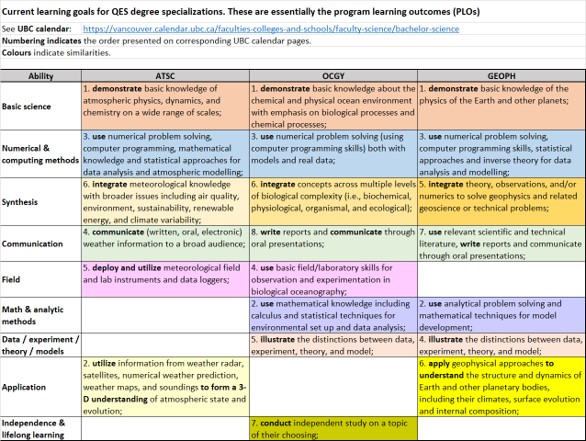This page is simply a short summary of undergraduate degrees currently offered in the Department of EOAS and serves to define the quantitative Earth science disciplines for the purposes of the QuEST project. Discussions about possible adjustments to degree programs, or alternatives, are in the “possibilities” page, and corresponding recommendations are on the degrees recommendations page.
B.Sc. majors, honors and combined degrees are offered in six subject areas: Geophysics, Atmospheric Sciences, Oceanography, Geological Sciences, Earth & Ocean Sciences, and Environmental Sciences. A B.A.Sc. degree in Geological Engineering is also offered. Details are on the EOAS “degrees” web page.
Official degree requirements for all Faculty of Science degree specializations can be found starting at UBC’s Bachelor of Science degrees calendar page.
The first three (Geophysics, Atmospheric Sciences & Oceanography) are considered the more “quantitative” or math/physics/computing oriented B.Sc. degree specializations. For the purposes of the QuEST project, these are considered the Quantitative Earth Science or QES disciplines.
Table of official program learning objectives for QES degree programs, summarized for comparison. Click the table to see full-page PDF version.
Students in other specializations do of course develop quantitative capabilities, and many recommendations emerging from the QuEST project will be relevant in those courses and degree programs. However, the focus is mainly on the primarily quantitative disciplines.
Professional Registration for EOAS graduates
Keeping professional registration requirements in mind while considering courses, curriculum and student experiences is necessary because all geoscience professionals working in Canada, as well as many working in environmental disciplines, are legally required to become licensed with their provincial associations if they want to work without supervision (just like nurses, lawyers, etc.). Students expect to be qualified to work in their chosen professions upon graduation, therefore the curricula making up corresponding degrees must prepare students appropriately. Even graduate students should bear this reality in mind.
Pursuing graduate work and obtaining an MSc or PhD in the geosciences only counts to some extent as “experience”. The prospective licensee still requires the academic credentials obtained by taking the necessary undergraduate courses. So getting that right as an undergraduate will make it much easier to register eventually when the individual finally leaves academics to work as a geoscience professional. Of course – these considerations are less relevant if they end up working in some field other than the geosciences.
Discussions and recommendations are detailed on a separate professional registration page.

